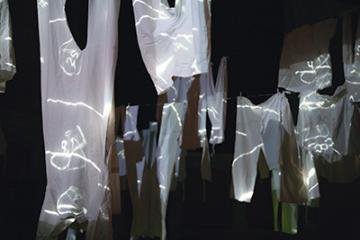Shilpa Gupta
dal 12/6/2008 al 2/8/2008
Segnalato da
12/6/2008
Shilpa Gupta
BodhiBerlin, Berlin
BlindStars StarsBlind. The two-sited exhibition consists of some twenty works that help to grasp those concerns which drive her aesthetic and media judgements in the age of global mediation and cultural translation. Curated by Shaheen Merali.

Curated by Shaheen Merali
Assistant curator Marc Wellmann
BodhiBerlin is presenting the first monograph exhibition in Germany of the eminent media artist Shilpa Gupta, in conjunction with Volker Diehl Gallery. Both galleries are currently collaborating with this renowned artist to allow Berliners and mainland European audiences further access to her particular use of both regional and political geography, in tackling issues that include notions of borders and between media, religions
and countries.
The work of Shilpa Gupta has been widely shown in the context of major group exhibitions including the Media City Seoul Biennale in 2004, the Biennales of Sydney, Shanghai, Havana, Liverpool in 2006, and Lyon in 2007. She has had a number of monograph shows in New York and Mumbai, where her oeuvre has been widely acclaimed and welcomed for its vehement reworking of the mixed media tradition. Her ensemble of works – since 1997 when she graduated from the B.F.A. Sculpture at the prestigious Sir J. J. School of Fine Arts, Mumbai – has included the use of interactive mediums fused with traditional sculptural and photographic elements. Performance has also played a major role in demonstrating her ability to contextualise difficult contemporary subjects and subjectivities including personal space, and the abrupt global relationship to security and alterity: the internal experience of “difference”.
Gupta has travelled extensively through international residency programmes including the Unesco-Aschberg residency at CYPRES, Aix en Provence, France and the Alchemy workshop organised by ANAT, Brisbane, Australia. Through this intensive period of interrogating the local conditions within the international realm of cultural production, she has been able to gauge the finer conditions of both the effects of internationalism within the language of fine art and also the current condition that we have begun to call globalisation. BlindStars StarsBlind is an apt title for an exhibition of work by an artist who uses language in a fragmented form of translation. The works by Gupta talk about region, border and territory to express themselves in their own kind of historical intention.
The two-sited exhibition consists of some twenty works that help to grasp those concerns which drive her aesthetic and media judgements in the age of global mediation and cultural translation. She described her concerns in a recent talk/interview in Mumbai: “Often artists like me who are working in a so called ‘activist’ role – become branded as activist artists”. The role of activism is a driving force for many of her observations as she visually vocalizes her deep-felt concerns for the plight of those who remain speechless and are made silent through disempowering conditions.
Gupta was one of the facilitators of Aar-Paar 3, a public art exchange project between India and Pakistan, and of Crossovers & Rewrites: Borders over Asia at the Museum of Contemporary Art for the World Social Forum, Porto Alegre, Brazil. In addition, she co-facilitated Spice Adventures, a collaborative project “about children’s animations and game Cds” produced by the Majlis Group. The crossover between facilitation, production, performance and gallery practice creates a rich mix that helps render the agonizing cosmopolis of cultural exchange and political discourse. Triggering such mechanisms and positions, Gupta allows us to evaluate the lived and perceived experiences of our realities by bringing together a number of contradictions in the fabric of contemporary life and our notions of freedom.
Berlin’s former thriving metropolis, split between two political ideological factions for most of the last century, lies straddled across the intersection of East and West. Gupta, an artist fascinated by ideas of border crossing and split identities, personifies this bifurcation of the contemporary situation, and it is poignantly relevant to this city beleaguered by history that it is being shown simultaneously in galleries both in the former East and West. Furthermore, Gupta’s leanings towards a more democratising, even socialist agenda in terms of ideology allows her to remain somewhat sceptical of the role of the market place in the artistic realm. Her works question this contradictory position in both their construction and in the context.
In creating a world as her ambition, she helps us to manage the necessary labour in looking at and measuring a strategic globalisation, which is based on disruption rather than focussing on a crisis state where consumerism seems to be the only measurable form of change.
BodhiBerlin
Halle am Wasser, Invalidenstrasse 50-51- Berlin



